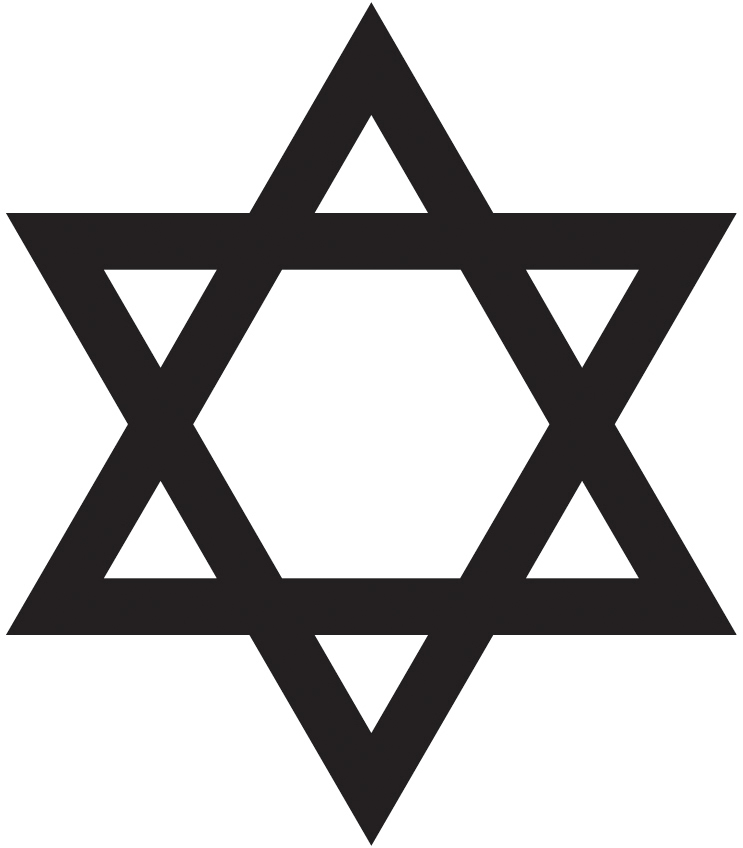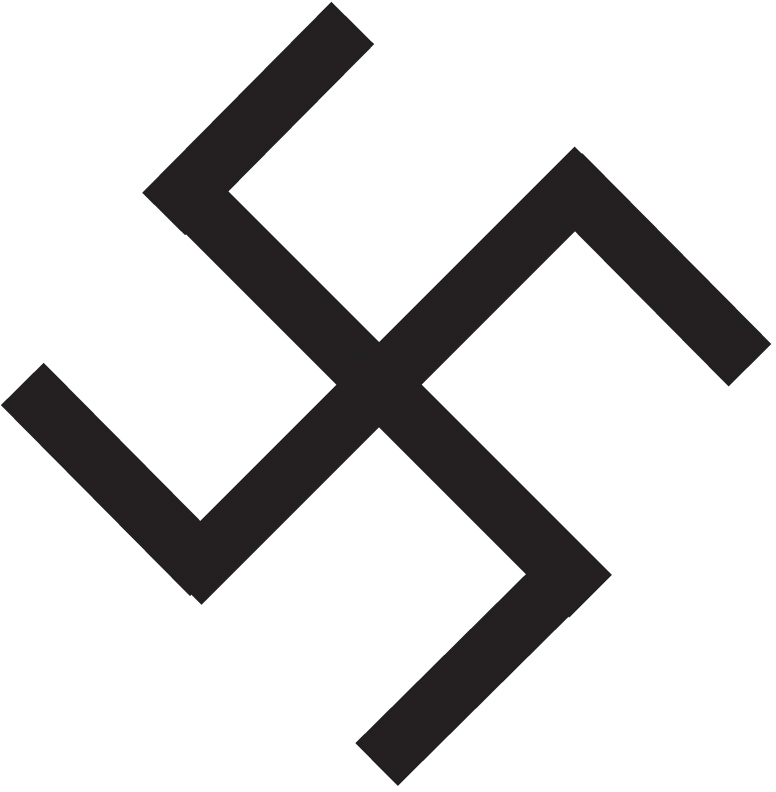
‘All I know is this,’ began Shmuel. ‘Before we came here I lived with my mother and father and my brother Josef in a small flat above the store where Papa makes his watches. Every morning we ate our breakfast together at seven o’clock and while we went to school, Papa mended the watches that people brought to him and made new ones too. I had a beautiful watch that he gave me but I don’t have it any more. It had a golden face and I wound it up every night before I went to sleep and it always told the right time.’
‘What happened to it?’ asked Bruno.
‘They took it from me,’ said Shmuel.
‘Who?’
‘The soldiers, of course,’ said Shmuel as if this was the most obvious thing in the world.
‘And then one day things started to change,’ he continued. ‘I came home from school and my mother was making armbands for us from a special cloth and drawing a star on each one. Like this.’ Using his finger he drew a design in the dusty ground beneath him.

‘And every time we left the house, she told us we had to wear one of these armbands.’
‘My father wears one too,’ said Bruno. ‘On his uniform. It’s very nice. It’s bright red with a black-and-white design on it.’ Using his finger he drew another design in the dusty ground on his side of the fence.

‘Yes, but they’re different, aren’t they?’ said Shmuel.
‘No one’s ever given me an armband,’ said Bruno.
‘But I never asked to wear one,’ said Shmuel.
‘All the same,’ said Bruno, ‘I think I’d quite like one. I don’t know which one I’d prefer though, your one or Father’s.’
Shmuel shook his head and continued with his story. He didn’t often think about these things any more because remembering his old life above the watch shop made him very sad.
‘We wore the armbands for a few months,’ he said. ‘And then things changed again. I came home one day and Mama said we couldn’t live in our house any more—’
‘That happened to me too!’ shouted Bruno, delighted that he wasn’t the only boy who’d been forced to move. ‘The Fury came for dinner, you see, and the next thing I knew we moved here. And I hate it here,’ he added in a loud voice. ‘Did he come to your house and do the same thing?’
‘No, but when we were told we couldn’t live in our house we had to move to a different part of Cracow, where the soldiers built a big wall and my mother and father and my brother and I all had to live in one room.’
‘All of you?’ asked Bruno. ‘In one room?’
‘And not just us,’ said Shmuel. ‘There was another family there and the mother and father were always fighting with each other and one of the sons was bigger than me and he hit me even when I did nothing wrong.’
‘You can’t have all lived in the one room,’ said Bruno, shaking his head. ‘That doesn’t make any sense.’
‘All of us,’ said Shmuel, nodding his head. ‘Eleven in total.’
Bruno opened his mouth to contradict him again – he didn’t really believe that eleven people could live in the same room together – but changed his mind.
‘We lived there for some more months,’ continued Shmuel, ‘all of us in that one room. There was one small window in it but I didn’t like to look out of it because then I would see the wall and I hated the wall because our real home was on the other side of it. And this part of town was the bad part because it was always noisy and it was impossible to sleep. And I hated Luka, who was the boy who kept hitting me even when I did nothing wrong.’
‘Gretel hits me sometimes,’ said Bruno. ‘She’s my sister,’ he added. ‘And a Hopeless Case. But soon I’ll be bigger and stronger than she is and she won’t know what’s hit her then.’
‘Then one day the soldiers all came with huge trucks,’ continued Shmuel, who didn’t seem all that interested in Gretel. ‘And everyone was told to leave the houses. Lots of people didn’t want to and they hid wherever they could find a place but in the end I think they caught everyone. And the trucks took us to a train and the train…’ He hesitated for a moment and bit his lip. Bruno thought he was going to start crying and couldn’t understand why.
‘The train was horrible,’ said Shmuel. ‘There were too many of us in the carriages for one thing. And there was no air to breathe. And it smelled awful.’
‘That’s because you all crowded onto one train,’ said Bruno, remembering the two trains he had seen at the station when he left Berlin. ‘When we came here, there was another one on the other side of the platform but no one seemed to see it. That was the one we got. You should have got on it too.’
‘I don’t think we would have been allowed,’ said Shmuel, shaking his head. ‘We weren’t able to get out of our carriage.’
‘The doors are at the end,’ explained Bruno.
‘There weren’t any doors,’ said Shmuel.
‘Of course there were doors,’ said Bruno with a sigh. ‘They’re at the end,’ he repeated. ‘Just past the buffet section.’
‘There weren’t any doors,’ insisted Shmuel. ‘If there had been, we would all have got off.’
Bruno mumbled something under his breath along the lines of ‘Of course there were’, but he didn’t say it very loud so Shmuel didn’t hear.
‘When the train finally stopped,’ continued Shmuel, ‘we were in a very cold place and we all had to walk here.’
‘We had a car,’ said Bruno, out loud now.
‘And Mama was taken away from us, and Papa and Josef and I were put into the huts over there and that’s where we’ve been ever since.’
Shmuel looked very sad when he told this story and Bruno didn’t know why; it didn’t seem like such a terrible thing to him, and after all much the same thing had happened to him.
‘Are there many other boys over there?’ asked Bruno.
‘Hundreds,’ said Shmuel.
Bruno’s eyes opened wide. ‘Hundreds?’ he said, amazed. ‘That’s not fair at all. There’s no one to play with on this side of the fence. Not a single person.’
‘We don’t play,’ said Shmuel.
‘Don’t play? Why ever not?’
‘What would we play?’ he asked, his face looking confused at the idea of it.
‘Well, I don’t know,’ said Bruno. ‘All sorts of things. Football, for example. Or exploration. What’s the exploration like over there anyway? Any good?’
Shmuel shook his head and didn’t answer. He looked back towards the huts and turned back to Bruno then. He didn’t want to ask the next question but the pains in his stomach made him.
‘You don’t have any food on you, do you?’ he asked.
‘Afraid not,’ said Bruno. ‘I meant to bring some chocolate but I forgot.’
‘Chocolate,’ said Shmuel very slowly, his tongue moving out from behind his teeth. ‘I’ve only ever had chocolate once.’
‘Only once? I love chocolate. I can’t get enough of it although Mother says it’ll rot my teeth.’
‘You don’t have any bread, do you?’
Bruno shook his head. ‘Nothing at all,’ he said. ‘Dinner isn’t served until half past six. What time do you have yours?’
Shmuel shrugged his shoulders and pulled himself to his feet. ‘I think I’d better get back,’ he said.
‘Perhaps you can come to dinner with us one evening,’ said Bruno, although he wasn’t sure it was a very good idea.
‘Perhaps,’ said Shmuel, although he didn’t sound convinced.
‘Or I could come to you,’ said Bruno. ‘Perhaps I could come and meet your friends,’ he added hopefully. He had hoped that Shmuel would suggest this himself but there didn’t seem to be any sign of that.
‘You’re on the wrong side of the fence though,’ said Shmuel.
‘I could crawl under,’ said Bruno, reaching down and lifting the wire off the ground. In the centre, between the wooden telegraph poles, it lifted quite easily and a boy as small as Bruno could easily fit through.
Shmuel watched him do this and backed away nervously. ‘I have to go back,’ he said.
‘Some other afternoon then,’ said Bruno.
‘I’m not supposed to be here. If they catch me I’ll be in trouble.’
He turned and walked away and Bruno noticed again just how small and skinny his new friend was. He didn’t say anything about this because he knew only too well how unpleasant it was being criticized for something as silly as your height, and the last thing he wanted to do was be unkind to Shmuel.
‘I’ll come back tomorrow,’ shouted Bruno to the departing boy and Shmuel said nothing in reply; in fact he started to run off back to the camp, leaving Bruno all on his own.
Bruno decided that that was more than enough exploration for one day and he set off home, excited about what had happened and wanting nothing more than to tell Mother and Father and Gretel – who would be so jealous that she might just explode – and Maria and Cook and Lars all about his adventure that afternoon and his new friend with the funny name and the fact that they had the same birthday, but the closer he got to his own house, the more he started to think that that might not be a good idea.
After all, he reasoned, they might not want me to be friends with him any more and if that happens they might stop me coming out here at all. By the time he went through his front door and smelled the beef that was roasting in the oven for dinner he had decided that it was better to keep the whole story to himself for the moment and not breathe a word about it. It would be his own secret. Well, his and Shmuel’s.
Bruno was of the opinion that when it came to parents, and especially when it came to sisters, what they didn’t know couldn’t hurt them.